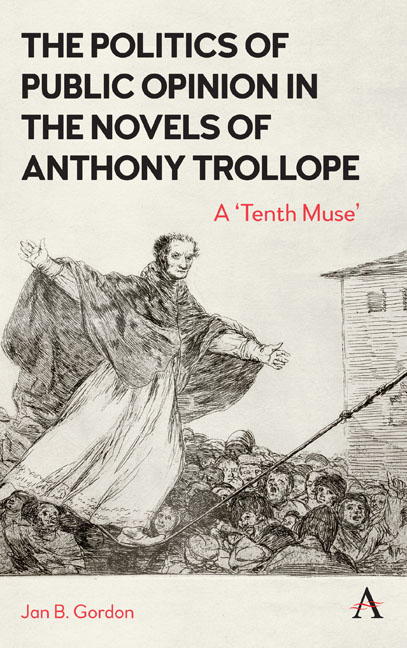Book contents
- Frontmatter
- Frontispiece
- Contents
- Preface: Overture to an Initial Public Offering
- Chapter One The “Prosthetic Body” of Public Opinion in Barsetshire
- Chapter Two Miming the Law
- Chapter Three “Playing” the Opinion Market
- Chapter Four The “Management” of Public Opinion in Trollope’s Bureaucracies
- Chapter Five The Sugar
- Index
Chapter Four - The “Management” of Public Opinion in Trollope’s Bureaucracies
Published online by Cambridge University Press: 17 October 2023
- Frontmatter
- Frontispiece
- Contents
- Preface: Overture to an Initial Public Offering
- Chapter One The “Prosthetic Body” of Public Opinion in Barsetshire
- Chapter Two Miming the Law
- Chapter Three “Playing” the Opinion Market
- Chapter Four The “Management” of Public Opinion in Trollope’s Bureaucracies
- Chapter Five The Sugar
- Index
Summary
The man who can manage the purse-strings of the country can manage anything.
(CYFH I 236, ital. added)The words spoken by the Duke of St. Bungay, an elder Liberal Party patriarch, an endorsement of the candidacy of Plantagenet Palliser as a future chancellor of the exchequer, suggests that efficient economic management, like the maintenance of land or reputation, is a respected, if vaguely defined, skill. The discipline required by material management has potentially wider applications to policy. But his endorsement is no different from that of Scruby, the electoral agent (later, upwardly mobile as a clerk for Attorney Chaffanbrass in Phineas Redux), who urges tight management upon his client, George Vavasor, even while conceding that his candidate's advertising has been consigned to an agent with largely absentee supervision. Proper management involves delegation of authority, apparently, though the deputized are often invisible.
Although thought of as a thinly-veiled portrait of a younger Trollope's experience while at the General Post Office, The Three Clerks (1857) is much richer insofar as it portrays a politics (as the distribution of power) within government agencies charged with the regulation and maintenance of public services. The plot is driven initially by two young clerks, Harry Norman and Alaric Tudor, his close friend, apprenticed to Weights and Measures, and a third, cousin to Alaric, Charley Tudor, consigned to a less dignified branch, Internal Navigation (or “Navvies”). The class system is pervasive, even in institutions dedicating to servicing the public at large. There, Tudor enjoys a somewhat louche after-hours sociality with an assortment of barmaids and dance hall companions. In another of Trollope's interregnums, there are at least three possible (albeit conflicting) avenues to membership in the civil service. Political access to the governing class, enabling future bureaucrats to “hang on round the outer corners of the State's temple” (TTC 81), would appear to have a number of competing avenues. Friendship with or descent from nobility; a newly instituted system of rigorous examination by committee to determine entry and staged promotion; and finally—and most idealistically—knowledge acquired by direct experience would all qualify. Yet, a retired seaman on pension at half-pay, the crusty Captain Cuttwater represents the hopelessness of experience ever qualifying one for a position at, say, Admiralty, that might usefully make room for his vast knowledge of seafaring.
- Type
- Chapter
- Information
- The Politics of Public Opinion in the Novels of Anthony TrollopeA 'Tenth Muse', pp. 127 - 176Publisher: Anthem PressPrint publication year: 2023

